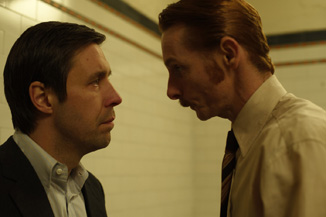Chapter Two:
Red Riding 1980
By Brett Beach
February 17, 2011
This week’s column centers on dead children — lots of cinematically dead children — as a primary topic and police corruption as a secondary concern. Moments of levity, I think, may be few and far between.
I can’t necessarily chalk it up to the randomness of the universe, but a fair number of my recent rentals from the library have dealt in more than just passing detail with the death of a child. Being a parent hasn’t necessarily made me more susceptible to the sway of such a dramatic device — I think at this moment of a college friend who was also a cinephiliac and noted quite accurately while we were at school “It’s easy to get me to cry. Kill a kid or a dog, tears are easily jerked” — but it has raised my level of empathy for fictional families who lose one of their members.
I watched Nicolas Roeg’s 1973 mood piece Don’t Look Now for only the second time and feel that it is a rare film that succeeds completely at establishing an emotional (versus logical) stranglehold over its audience. It begins with a sense of disquiet in an otherwise idyllic scene and never releases the audience from that foreboding air. Dealing with the aftermath of the drowning of a young girl, the film shows how that incident becomes a crack in an otherwise strong marriage. Mixing dream fever logic, second sight, and an accumulating sense of wholly enveloping dread, Don’t Look Now make a strong argument through working through the pain of such a loss, and for never, ever, ever, walking the streets of Venice alone at night.
Though I have no doubt that I must have been aware of Grave of the Fireflies at several points throughout the '90s and beyond (another college friend swears he mentioned it on numerous occasions and I have no reason to doubt him), it wasn’t until I came across Roger Ebert’s Great Movies review of it three years ago, that I took note of it. Based on his criticism and the comments readers logged in response, I knew that I would want to see it, and that I would have to be in the right frame of mind for a story of such unbearable sadness. I am happy (?) to say that it wasn’t as annihilatingly sad as I feared, but only because I had misinformed myself on one of the plot points.
Isao Takahata’s 1988 animated drama, an adaptation of Akiyuki Nosaka’s memoir, is a quietly devastating tale of Setsuko and Seita, a brother and sister left to fend for themselves in rural Japan during the closing days of World War II, as Allied fire bombings have killed their mother and their soldier father remains away at sea. First rooming with an aunt who views them as a nuisance, they eventually take to living in a nearby fallout shelter, bartering, scrounging, and even stealing to secure an ever dwindling food supply.
Continued:
1
2
3
4

![]() Tweet
Tweet
![]() Print this column
Print this column



